
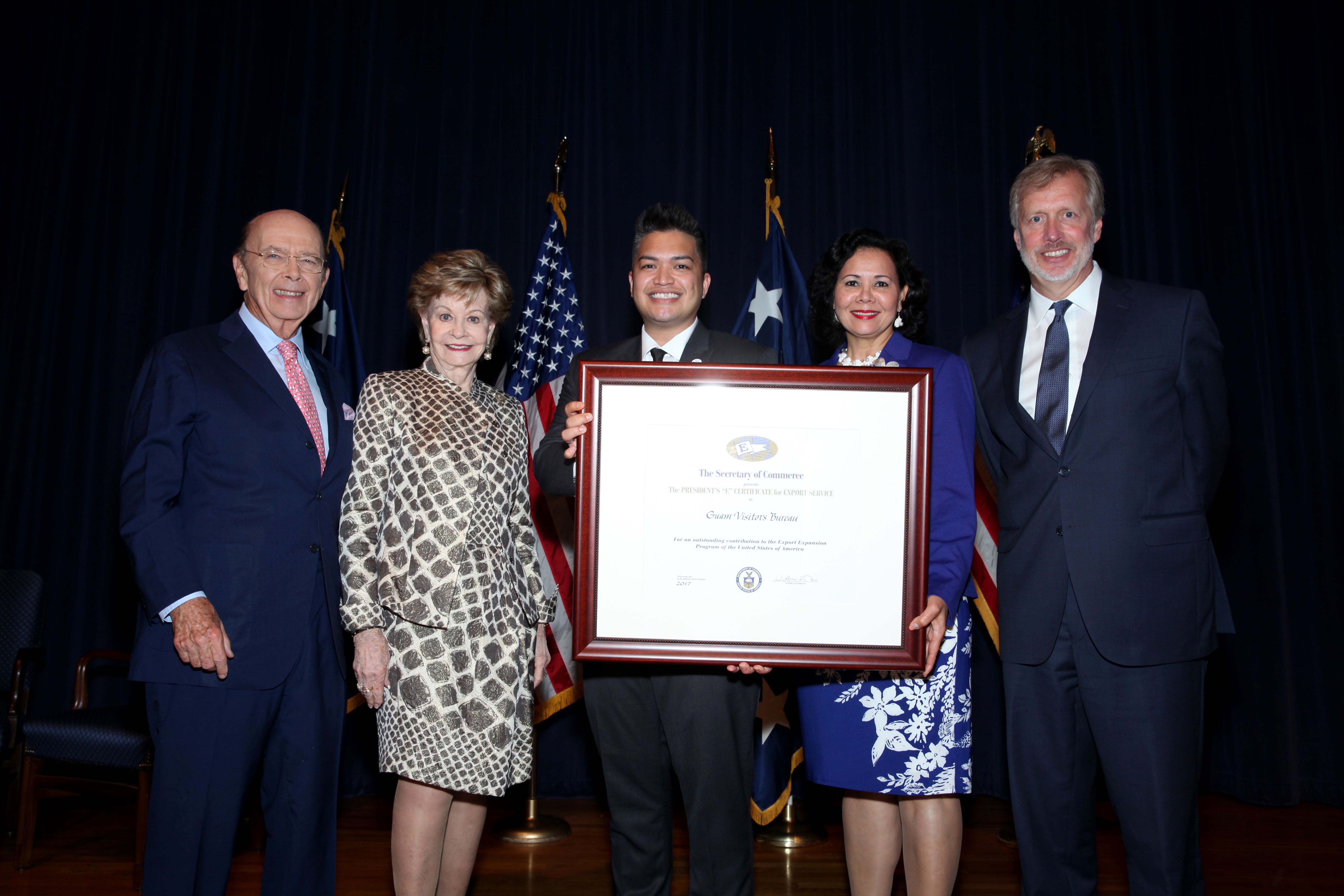
GVB Receives President’s “E” Award – First tourism office ever to receive the highest export award in the U.S.
Tuesday, May 30, 2017 – Tumon, Guam, U.S. Secretary of Commerce Wilbur Ross presented the Guam Visitors Bureau with the President’s “E” Award for Export Service at a ceremony in Washington, D.C., May 22. The President’s “E” Award is the highest recognition any U.S. entity can receive for making a significant contribution to the expansion of U.S. exports.
“The Guam Visitors Bureau has demonstrated a sustained commitment to export expansion. The “E” Awards Committee was very impressed with GVB’s Tourism 2020 strategic plan development and engagement, which resulted in exceptional year-over-year growth in tourism to Guam. The organization’s innovative and broad-reaching program to capture larger segments of the Chinese tourism market was also particularly notable. GVB’s achievements have undoubtedly contributed to national export expansion efforts that support the U.S. economy and create American jobs,” said Secretary Ross in his congratulatory letter to the company announcing its selection as an award recipient.
“The hard workers at GVB are humble, but this really comes at no surprise. It only makes sense that Guam’s tourism officials get national recognition because these folks are at the top of their game in this country. Despite the very rapid increase in the number and quality of tourist destinations in this area, Guam’s market share has sustained and in most cases has even grown. We offer a resort destination that is growing as a second-to-none choice for travelers from a diversifying geographic field. This isn’t a coincidence. This is the result of smart strategy, cooperative development, and an industry of workers who set the standard for quality and service,” said Guam Governor Eddie Calvo.
Congresswoman Madeleine Bordallo was present at the awards ceremony and joined GVB Vice President Antonio Muña, Jr. and GVB Director of Global Marketing Pilar Laguaña to receive the award.
“I commend the Guam Visitors Bureau on receiving the President’s “E” Award from the U.S. Department of Commerce,” said Congresswoman Bordallo. “This is the nation’s highest honor recognizing organizations which contribute significantly in the effort to increase U.S. exports. This award is a reflection of GVB’s success in marketing Guam as a world class international destination and the growth in our tourism industry in recent years. I am proud of the success GVB has made to strengthen our visitor industry and attract visitors from new countries to visit and invest in Guam. This is the first time an organization from Guam has received this award, and I congratulate GVB’s management and staff on this accomplishment. I look forward to continue working with them to promote Guam and our vibrant culture to visitors and markets around the world.”
In total, Secretary Ross honored 32 U.S. companies and organizations from across the country with the President’s “E” Award for their role in strengthening the U.S. economy by sharing American ingenuity outside of our borders.
“It is an honor to be the first tourism organization in the United States that received this prestigious award and contribute to the export expansion program of the United States of America. We are proud to represent Guam and accept this award on behalf of our local community and the thousands of people that are working hard in Guam’s number one industry,” said GVB President and CEO Nathan Denight. “As we continue to welcome over 1.5 million visitors annually and evolve as a world class destination, this milestone is a reminder that tourism works to promote our Chamorro culture to the world and better the quality of life for all those that call Guam home.”
U.S. exports totaled $2.21 trillion in 2016, accounting for nearly 12 percent of U.S. gross domestic product. Exports supported an estimated 11.5 million jobs nationwide in 2015, according to the most recent statistics from the International Trade Administration.

ICTP President Lipman writes to his new friend Ivanka Trump about women Curators and SUN Centers
Ivanka Trump is the “first daughter” in the United States of America. Her father, US President Donald Trump has been a controversial figure when it comes to climate change and tourism.
Geoffrey Lipman can be considered a senior celebrity in the travel and tourism world. Lipman is president of the International Coalition of Tourism Partners (ICTP) and co-founder of SUN. ICTP is a Haleiwa, Hawaii-based association of tourism destinations and stakeholders with members in more than 100 countries.
Brussels based Professor Lipman has a unique proposal to the first daughter and pledged to have SUN Centers manned only by women Curators and learners.
He wrote in his open letter to Ivanka Trump today:
Dear Ivanka
I want to start by “walking back” my last few months of Facebook comments on the style, morality, and substance of your father and his strategies. I misspoke.
I am writing because I see that on your recent trip to Saudi Arabia you managed to secure a donation of some 100 million dollars for your new fund for women entrepreneurs.
Also, I read (admittedly in liberal media) that another of your pet projects is climate change – and that you may be able to influence US policy on this (which would be great – go for it).
I have a small project that falls neatly into the sweet spot between your heartfelt interests and was wondering if there was scope for collaboration.
SUNx the Strong Universal Network wants to help Travelism (Travel & Tourism) destinations and all their stakeholders become more climate resilient through what we call Impact-Travel – measured, green and 2050 focused. If we could help move the sector progressively to a green growth, low-carbon, socially inclusive trajectory it would make a huge difference to the overall global shift.
With like-minded colleagues, we have created a robust plan to put learning centres in every country over the next decade, connected in the cloud and sharing innovations and response techniques between communities. Many of the solutions exist and others will flow from concentration on. the SDG and Climate targets (where I know you will be able to help your Dad reach the right answer for humanity)
We have a proof of concept center launching in the last quarter of this year in Belgium’s National Park in the Province of Limburg. Our work is self-financed to date and now we are about to look for Impact Investors who share our vision and belief in positive action to beat extreme climate change. Frankly, we need 2 million dollars to operationalize and my thoughts immediately turned to you.
What if we ensure SUNx Centres are manned (you know what I mean) only by women Curators and learners. Could you see your way to investing 2 million of the Saudi Arabian contribution with us? We have a payback schedule over 10 years and a return of 5% per annum.
Please let me know what you think – your new friend
Geoffrey Lipman
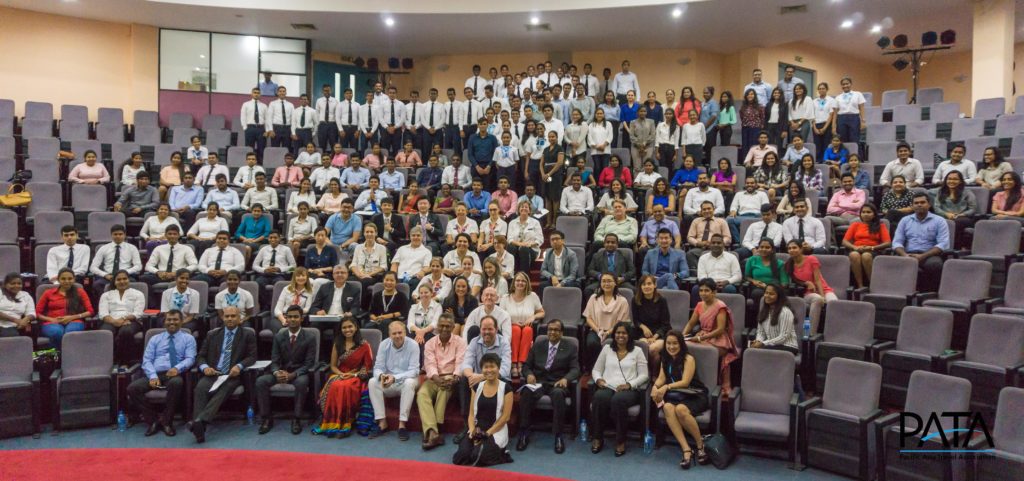
PATA Youth Symposium explores millennials and the future of tourism
BANGKOK, May 23, 2017 – The PATA Youth Symposium held on Thursday, May 18, 2017 in Colombo, Sri Lanka, welcomed 130 students, alumni and lecturers from various institutions from Sri Lanka, Australia and Macao SAR to discuss the next generation’s role in the future of travel and tourism.
The event, hosted generously by the Sri Lanka Institute of Tourism & Hotel Management (SLITHM) and supported by the Sri Lanka Convention Bureau on the first day of the PATA Annual Summit, was organised under the theme ‘No Barriers: Millennials and the Future of Tourism’.
In his opening address PATA CEO Dr. Mario Hardy stated, “The travel and tourism industry is a fun and exciting industry. Once you’ve joined you may never want to leave. It is about getting to know the unique cultures of various destinations, and I appreciate all the students who have joined us here to share their insights and thoughts on the future of the travel and tourism industry.”
Mr Hiran Cooray, Chairman of Jetwing Hotels, shared his experience of when he attended his first PATA event in Bali in 1991, noting, “By listening to many experience speakers, I started to think and absorb different ideas. For the younger generation, I encourage you to listen to experienced travel professionals. Some ideas might not make any sense to you now but it will make a lot of sense when you start working in the industry. We have the responsibility to look after our environment and our nature. If you don’t do that, nature will fight back. Remember the key messages shared with you and apply them every day as you take on more responsibilities for our industry and our environment.”
Mr Sunil Dissanayake, Chairman of the Sri Lanka Institute of Tourism & Hotel Management (SLITHM) said, “Millennials are looking for interesting and challenging work experience. The tourism and hospitality sector offers great opportunity for millennials in different roles”.
The programme was moderated and developed with guidance from Dr. Chris Bottrill, Chairman of the PATA Human Capital Development (HCD) Committee and Dean, Faculty of Global and Community Studies at Capilano University. Dr. Bottrill thanked the Sri Lanka Institute of Tourism & Hotel Management (SLITHM) and the Sri Lanka Convention Bureau for hosting and supporting the event. He also encouraged every student to actively participate in the discussions.
“We had a wonderful time with students from Sri Lanka Institute of Tourism and Hospitality Management and six other universities and colleges at the PATA Youth Symposium discussing millennials and the future of tourism. In our discussions, students noted the value of caring for the environment and their communities, embracing technology, providing healthy and organic foods, achieving gender equality, and the importance of embracing multiculturalism in our industry. We were very impressed with the insight that students showed toward the future of tourism and what their role in it will be.”
Mr Andrew Chan, Founder and CEO, ACI HR Solutions, Singapore, delivered the opening plenary talk on ‘Talent and Recruitment in the Tourism Industry – The future for Gen Y and Millennials’. He said, “A shortage of specialist skills in every Asian country is currently the greatest single challenge facing human resource departments. By 2020, millennials will form 50 percent of the global workforce. Up to 80 percent of the current workforce in some travel companies in Asia are millennials. Forty nine percent of millennials chose current travel industry job for the good opportunities in their career progression, making it the most important job selection factor. For millennials, development and work/life balance are more important than financial rewards.”
Ms Aleandre Kwan, Philanthropies Asia Programme Manager, Microsoft, Singapore talked about the ‘Corporate Commitment to Future Generations’. “More than 50 percent of today’s jobs require some technology skills, and experts say that this will increase to 77 percent in less than a decade. Microsoft’s mission is to empower every person and every organisation on the planet to achieve more.”
Mr Faeez Fadhlillah, CEO of Tripfez and the PATA Face of the Future 2017, talked about ‘Youth Entrepreneurship for the 21st Century’. He said that millennials were the first digitally native generation and tend to be active on social media. “Authenticity, values engagement, social validation, social acknowledgement are important to them.”
All participants shared their views in round-table discussions on the following topics:
Key responses from students to the question: What is important to the future Generation of Tourism Professionals?
1. Value of caring for the environment and their communities
2. Provide healthy and organic foods
3. Achieving gender equality, and the importance of embracing multiculturalism in our industry
Key responses from students to the question: How will Millennials and the next Generation Change the Future of Tourism?
1. Awareness of current situations and trends
2. Embrace the technology which can help you market products and services
3. Protect the environment
PATA Young Tourism Professional Ambassador, Ms JC Wong, informed the audience about PATA’s Young Tourism Professional programme and activities and the Association’s YTP student category membership.
The participants enjoyed fascinating cultural performances as part of the programme.
Photos from the event can be viewed here.
The PATA Human Capital Development Committee has organised successful educational events at various institutions including UCSI University Sarawak Campus (April 2010), Institute for Tourism Studies(September 2010), Beijing International Studies University (April 2011), Taylor’s University, Kuala Lumpur (April 2012), Lyceum of the Philippines University, Manila (September 2012), Thammasat University, Bangkok (April 2013), Chengdu Polytechnic, Huayuan Campus, China (September 2013), Sun Yat-sen University, Zhuhai Campus, China, (May 2014), Royal University of Phnom Penh (September 2014), Sichuan Tourism School, Chengdu, (April 2015), Christ University, Bangalore (September 2015), University of Guam, USA (May 2016) and President University (September 2016)
For further information, please view the programme here or email [email protected].

Joint Statement by the Caribbean Tourism Organization and International Union for Conservation of Nature on International Day for Biological Diversity
As the world comes together in recognition of the plethora of organisms and species that inhabit planet earth, the Caribbean Tourism Organization (CTO) is pleased to join with International Union for Conservation of Nature (IUCN) in celebration of International Day for Biological Diversity 2017.
This year, under the theme “Biodiversity and Sustainable Tourism” the CTO is particularly pleased that the global community continues to pay serious attention to the significance of tourism as a driving force for sustainable development.
CTO is acutely aware that the Caribbean is the most tourism-dependent region in the world, but it is not often recognised that there is a direct correlation between our region’s biological diversity and the scale of our tourism activity. Without question, Caribbean tourism products utilize the natural environment for myriad value propositions, and so whether one chooses to engage in whale-watching in Dominica, birdwatching in Trinidad and Tobago, snorkelling in the Cayman Islands or hiking in St. Kitts and Nevis, the biodiversity found in the Caribbean appeals to a wide range of visitors, and creates lasting observational and experiential memories for them to treasure.
In fact, the theme “Biodiversity and Sustainable Tourism” heralds a growing partnership between IUCN and the CTO, with one such output represented through IUCN’s sponsorship of the Biodiversity Conservation Award within CTO’s 2017 Caribbean Sustainable Tourism Awards.
We are remarkably blessed in the Caribbean with un-spoilt natural environments that not only lead to an enviable quality of life for our people, but the development of tourism as an economic pillar that allows us to share our rich habitat with the rest of mankind. It is therefore critical that we recognise and form partnerships with the champions that actively work to maintain balance with our sensitive biological treasures.
CTO and IUCN are pleased to collaborate to raise awareness and promote action towards the important contribution of sustainable tourism to economic growth and to the conservation and sustainable use of biodiversity.
Our actions matter, and CTO and IUCN are pleased to work together to ensure that the Caribbean remains mindful of both our environmental blessings and our responsibilities not just for present enjoyment, but for the benefit of future generations.
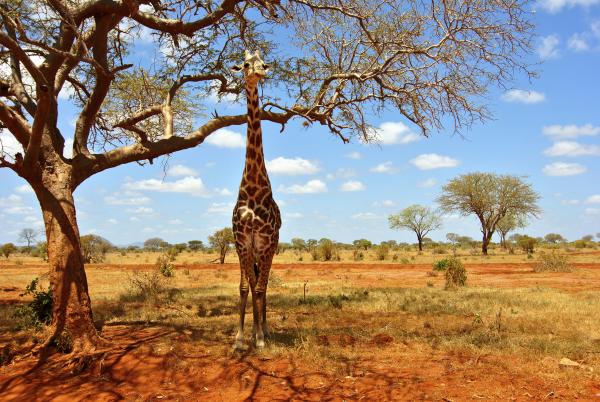
On the International Day for Biological Diversity UNWTO announces a training on tourism and biodiversity in West and Central Africa
The Convention on Biological Diversity of the United Nations has chosen ‘Biodiversity and Sustainable Tourism’ as the theme for the International Day for Biological Diversity, celebrated today 22 May 2017. On this occasion, UNWTO is launching a capacity building programme on sustainable tourism and biodiversity protection, to be implemented in West and Central Africa.
The programme will build on previous tourism and biodiversity seminars that UNWTO successfully delivered in The Gambia, Ghana, and Tanzania and will address biodiversity conservation and environmental protection, taking into account the importance of this topic to safeguard future opportunities for local people to generate income from sustainable tourism development.
The seminars to be held staring June 2017 will focus on building capacities of tourism stakeholders and on maintaining and improving the quality of the tourism product to enhance client satisfaction in the following countries: Benin, Democratic Republic of Congo, Gabon, Guinea (Conakry), and Niger.
Primary beneficiaries of the capacity building programme are tourism employees and small entrepreneurs at the grass root level who will be encouraged to act as champions for biodiversity conversation and environmental protection in their enterprises and communities.
The contribution of tourism to conservation is increasingly recognized by the international community. The Cancun Declaration on Mainstreaming the Conservation and Sustainable Use of Biodiversity for Wellbeing was released on the occasion of COP 13, (the 13th Conference of the Parties to the Convention on Biological Diversity) held in Mexico last December. The Declaration recalls that “tourism is an excellent vehicle to use in spreading environmental awareness worldwide, not to mention the livelihood support it provides for communities living in and around reserves and natural areas” and recognises that tourism can be an enabling agent of change.
Through these training seminars, UNWTO continues its long-standing work in strengthening capacities of tourism stakeholders in gaining a better understanding of the relationship between tourism and environmental protection, developing tourism products based on the unique biodiversity in a destination and using tourism development as an incentive to invest in biodiversity conservation and environmental protection.

Impact-Travel Company Triip.me signs UNWTO’s Private Sector Commitment to the Global Code of Ethics for Tourism.
Sri Lanka, 20 MAY, 2017 – Triip.me signed the United Nations World Tourism Organization’s (UNWTO) Private Sector Commitment to the Global Code of Ethics for Tourism in a signing ceremony today in Sri Lanka. Triip is the first Singaporean company to do so.
Formulated in 2011, The Commitment has been signed by 513 companies and associations as of May 2017. Its main objective is a promise by signatories to focus on issues such as human rights, social inclusion, gender equality, accessibility, and the protection of vulnerable groups and host communities in the course of their daily business.
“For Triip, this is both an honor and a serious commitment. Solving the issues outlined by the Code of Ethics for Tourism is why we exist. From day one our business model has created barrier-less access to the global tourism economy, creating thousands of jobs for local guides around the world as a result. Since then, we’ve broadened our impact scope to include working with hotels and other travel providers, leveraging cooperation to further sustainability, cultural and environmental protection, and also protect against the standardisation of destinations,” said Hai Ho, co-founder of Triip.
Founded in 2014, Triip is an impact-travel company dedicated to bringing together local experts and global travelers to create authentic local experiences. As a sharing economy platform, Triip enables passionate locals to become Triip Creators, i.e., create their own private tours to share their passion with travelers, earn money and make new friends – while also offering travelers one-of-a-kind local cultural experiences with real people. The whole process is facilitated by their website and mobile apps. Currently, there are 6,000 local experts in 650+ cities in over 100 countries around the word using Triip, and about 70% are women from low-income countries. By autumn this year, Triip will launch an integration with Booking.com to also offer hotel bookings through the platform alongside the private local tours, thus giving traditional lodging in 227 countries access to authentic, indie tour experiences for the first time ever. Further, a significant percentage of each hotel booking will be automatically given to pre-selected local and global impact partners.
Triip is also extending its impact mission to other business leaders through its CEO/Founder Type-A Retreats in Bhutan.
“As the world’s only carbon negative country, Bhutan is renowned for its practical emphasis on sustainability and happiness,” said Ha Lam, co-founder of Triip “Therefore Triip is exposing as many businesses leaders as possible to this unique country, so that they, too, can more practically build a more sustainable and happy world through their ventures.”
With this new mission as well as its expansion to 700 cities in 2017, Triip hopes to build a network of 1000 Impact hotels within the next two years.
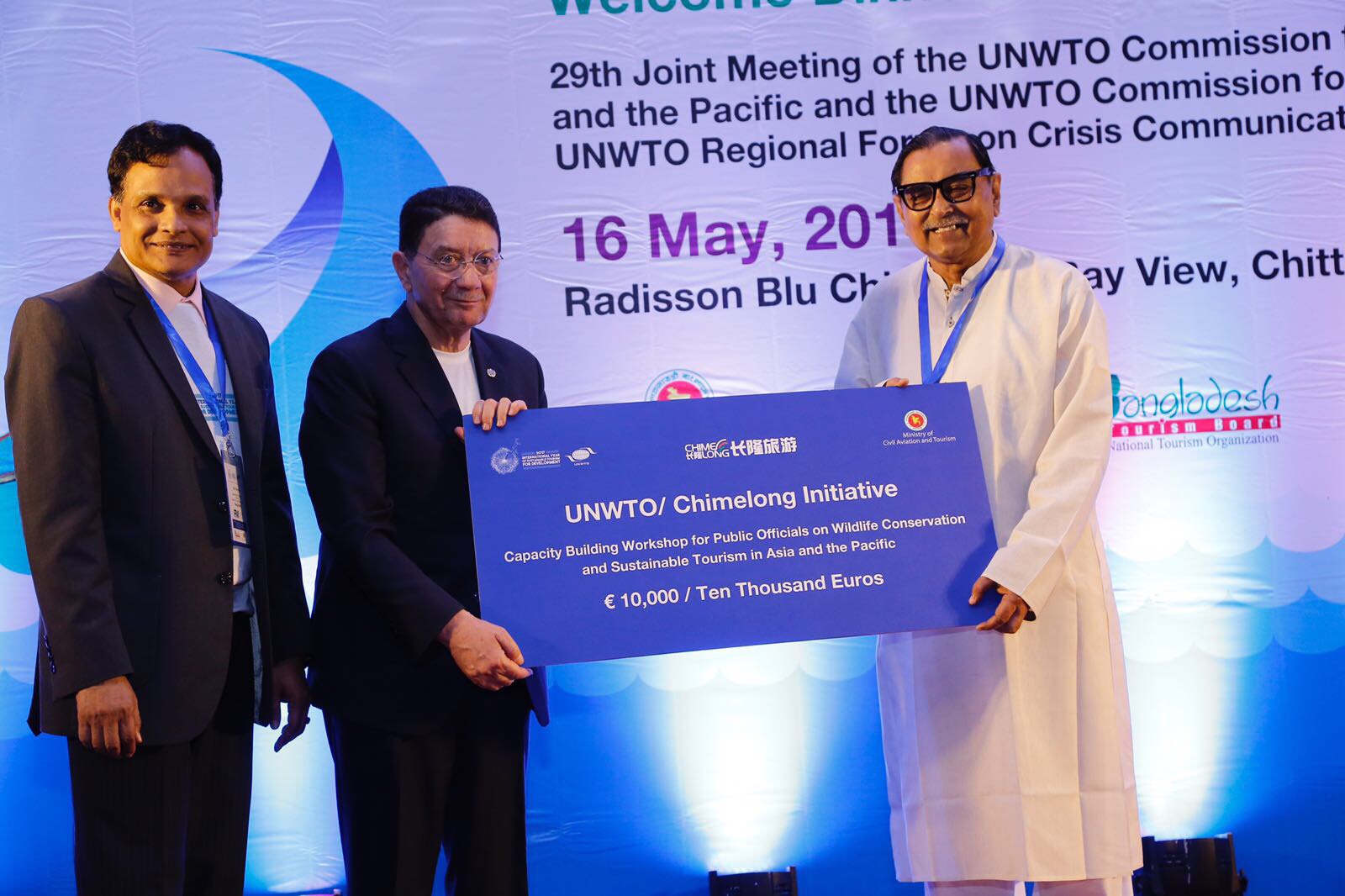
UNWTO Commission for Asia and the Pacific meets in Bangladesh
In 2016, Asia and the Pacific received 309 million international tourist arrivals, 9% more than in 2015; by 2030 this number is expected to reach 535 million. Over 20 countries gathered in Bangladesh on 16-17 May for the 29th joint meeting of the UNWTO Commissions for Asia and the Pacific and South Asia, to discuss challenges facing the sector in the region, opportunities for sustainable tourism development and the programme of work of UNWTO in Asia for the coming two years.
“With growth comes power, and with power, comes responsibility. With 1.8 billion international tourists foreseen to travel the world by 2030, we could end up with 1.8 billion opportunities or 1.8 billion disasters. These 1.8 billion travellers can and should translate into opportunities for inclusive economic growth, for more and better jobs, opportunities to protect our natural and cultural heritage, to better know and respect each other, to bond people, to distribute wealth and share prosperity,” said UNWTO Secretary-General Taleb Rifai, opening the event.
“Tourism can help us achieve the Sustainable Development Goals (SDGs). Your presence in Bangladesh will help us to support our tourism sector achieve its potential,” said the Minister of Civil Aviation and Tourism of Bangladesh, Rashed Khan Menon.
The meeting recalled the advances of the region in terms of visa facilitation, namely in Indonesia and India, in line with UNWTO’s priority to promote safe, secure and seamless travel. It also reviewed the work of the UNWTO technical committees on tourism competitiveness, sustainability, statistics and Tourism Satellite Account (TSA), and the activities being carried out at national level to celebrate the International Year of Sustainable Tourism for Development 2017.
Further items on the agenda included the transformation of the UNWTO Global Code of Ethics into an international convention and the creation of national committees on tourism ethics. Fiji was selected to host the 2018 Regional Commissions meeting and India as the proposed host country of the official celebrations of World Tourism Day in 2019.
Marking the International Year, UNWTO announced its support to Bangladesh in implementing capacity building programmes on wildlife and tourism within the UNWTO/Chimelong Initiative. Wildlife is one of the most important tourism assets of Bangladesh.
The joint meeting was preceded by a regional forum on crisis communication in tourism, with a step-by-step review of how to prepare a crisis communication plan and exchange of experiences in managing communication in situations of crisis, and of strategies for recovery.

2nd UNWTO Report on Gastronomy Tourism: sustainability and gastronomy
A major component of history, tradition and identity, gastronomy has also become a major motivation to visit a destination. According to the 2nd UNWTO Report on Gastronomy Tourism, this tourism segment “offers enormous potential in stimulating local, regional and national economies and enhancing sustainability and inclusion”. The Report was presented in the recent 3rd UNWTO World Forum on Gastronomy Tourism, held in San Sebastian, Spain in cooperation with the Basque Culinary Center.
Sixteen good practices in Gastronomy Tourism from different countries are showcased in the 2nd UNWTO Report on Gastronomy Tourism, touching on issues such as seasonality, training and innovation, ICT-related initiatives and wine-related itineraries. The publication stresses that in terms of tourist motivations, experiencing gastronomy is now at a similar level to visiting a museum, enjoying music and admiring the architecture of a destination. In this sense, gastronomy tourism has strong potential to improve destination management, promote cultures and contribute to other sectors such as agriculture and food manufacturing.
The commitment of gastronomy tourism towards the principles of sustainability has been one of the conclusions of the Forum held in San Sebastian. This includes areas such as poverty reduction, efficient use of resources, environmental protection and climate change, and the protection of cultural values, heritage and diversity.
The event was attended by around 250 participants from 60 countries and was inaugurated by UNWTO Secretary-General Taleb Rifai, Eneko Goia, Mayor of the City of San Sebastian, and the Director of the Basque Culinary Center, Joxe Mari Aizega.
The engagement of the traveller in these principles through his/her gastronomic experience was also underlined throughout the Forum. The need to develop appropriate policy measures and a strong governance framework was highlighted as a major conclusion. This would facilitate not only the commitment of relevant actors, but also the interaction among them, as well as the development of private-public partnerships.
The union between gastronomy and tourism provides therefore a platform to revitalize cultures, to preserve tangible and intangible heritage, to empower communities and to enhance intercultural understanding. These aspects were particularly tackled during the practical experiences included in the Forum, such as a cooking class and farm-to-table dining experiences.

UNWTO Passes Another Milestone
Professor Geoffrey Lipman co-founder SUNx, President International Coalition of Tourism Partners (ICTP) witnessed Friday’s election proceedings by the UNWTO Executive Council meeting in Madrid.
He writes:
I was reminded of Mrs Thatcher’s quip ”It’s a funny old world” watching the final stages of the election for the UN World Tourism Organization’s – Secretary General. The decision last week, of 33 Members of the Executive Council had several twists and turns before Georgia’s Ambassador to the Madrid based body, Zurab Pololikashvili – emerged victorious from a very close run off with Zimbabwe’s Minister of Tourism Walter Mzembi.
It started with the Seychelles candidate – former Tourism Minister Alain St. Ange – being disavowed by his country, under extreme pressure for solidarity from the African Union. Passionate and articulate St. Ange laid out the realities of his situation with a skill that hung over the rest of the process. It elicited a massive applause from the assembled UNWTO members.
Then the main event started
Each of the 5 remaining candidates laid out a 4-year plan for governing the organization. It was rich with ideas and it showed the wide range of challenges and opportunities facing the organization in the coming years. Security with ease of travel: digital technology: cyber resilience, sustainable development and climate change emerged as top concerns. At the same time, there was a widespread call for reshaping of an organization that already punches above its weight, to provide adequate financing, people, and technology to allow it to fulfil its mission. The style of each candidate was shown in a ten-minute presentation, differentiating them by vision and by charisma.
On one thing there was complete unanimity – the new Secretary General will have a tough act to follow in Taleb Rifai – who in his 8 years at the helm has brought the organization and the sector to a new level of sector leadership and public recognition.
In retrospect, the election itself reflected this, it was well organized, professionally managed with a balance of openness and internal process. Now it will be up to Zurab to deliver on the promise. (I predict that he will be known by his first name – at least on the tourism circuit)
Finally, I was pleased to see that climate resilience was one of his talking points – because it will be on his watch that broader recognition of the existential nature of this challenge will escalate. Our sector will have to radically reposition to respond. SUNx will be a constant reminder.
Professor Geoffrey Lipman co-founder SUNx, President International Coalition of Tourism Partners (ICTP).
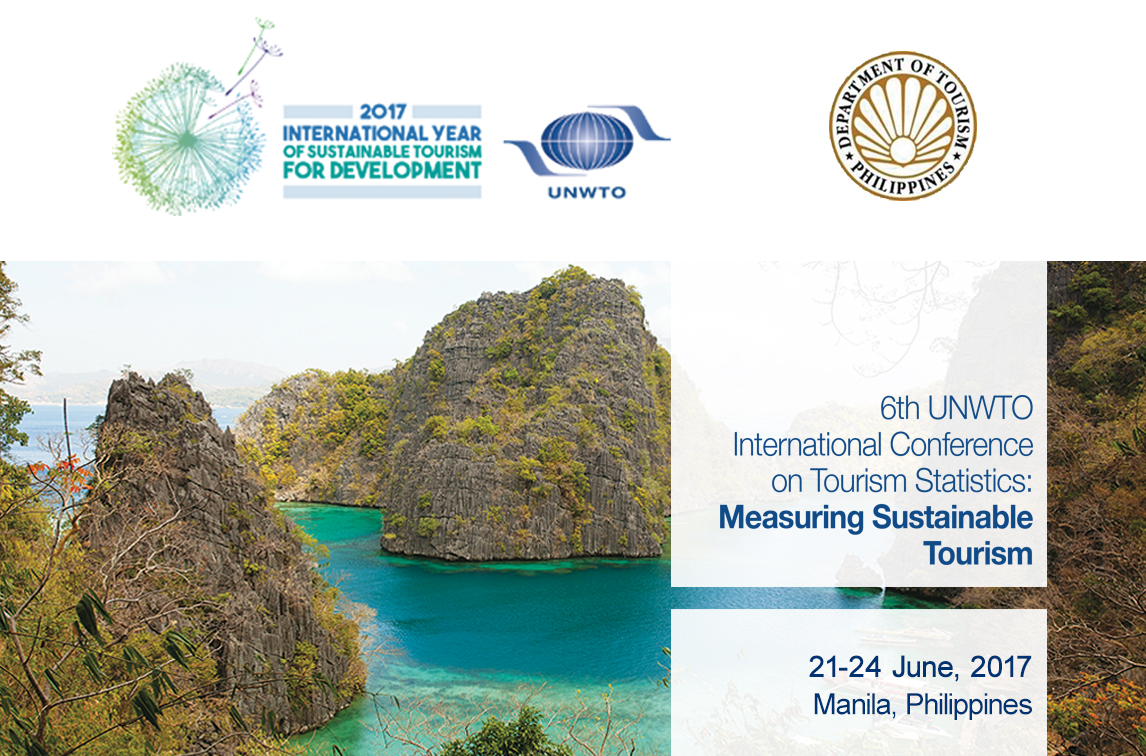
The Philippines will host the 6th UNWTO Conference on Tourism Statistics
Policy leaders, statisticians, academicians and private sector will convene in Manila, The Philippines, next June 2017 (21-24), to discuss new methodologies to measure the full impacts of tourism. The 6th edition of the World Tourism Organization (UNWTO) International Conference on Statistics, an official event of the International Year of Sustainable Tourism for Development 2017, will address the topic of ‘Measuring Sustainable Tourism’.
Supported by the United Nations Statistics Division, the UNWTO initiative ‘Towards a Statistical Framework for Measuring Sustainable Tourism’ (MST) underlines the need to measure the full effects of the tourism sector. The UNWTO International Conference to be held in Manila will serve as a platform to discuss the first draft of the MST framework and its future implementation.
The Philippines has become a reference in the region with regard to tourism measurement and a role model in the development of effective inter-institutional collaboration to develop tourism statistics. The commitment of the country, shown in the development of the Tourism Satellite Account framework, explains the decision to host the discussion on the MST initiative.
A Ministerial Roundtable will inaugurate the Conference in order to align efforts to advocate among governments the relevance of integrated and reliable data to manage and promote a more sustainable tourism sector. Afterwards, a Panel of Statistical Institutes will provide the opportunity to share experiences and practices implemented at global, regional and national level.
Other technical sessions will focus on understanding data demands, the link between the economic, the environmental and the social dimensions of sustainable tourism, including job creation, sub-national measurement, Sustainable Development Goals (SDGs) indicators, and data sources including big data.
Besides policy leaders, statistical experts and private sector, representatives from international organizations such as the International Labor Organization (ILO), the Organization for Economic Co-operation and Development (OECD), the United Nations Statistics Division (UNSD) and Eurostat will also contribute to the discussions.
